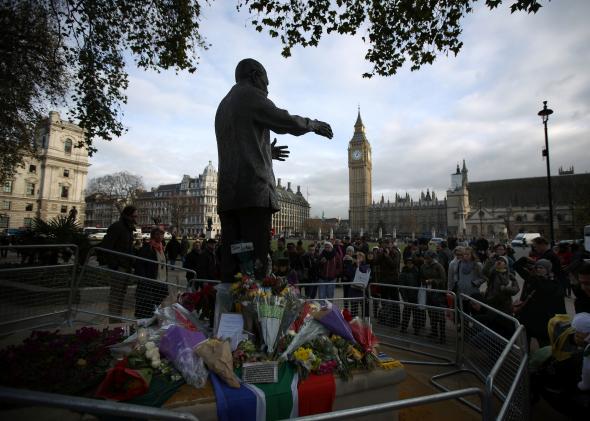Many conservative politicians and journalists who may have opposed Nelson Mandela in the 1980s have come around to recognizing him as a noble freedom fighter. In a great tribute, Deroy Murdock over at the National Review grapples with his past belief that Mandela would become the next Castro or Pol Pol. (Spoiler alert: He didn’t!)
But a peek into the comments section on Murdock’s story shows just how far the rift between conservative leaders and the members of their base can stretch:
“South African blacks had it better under apartheid, by far, than any other sub-Saharan blacks, and indeed better than most non-blacks in North Africa. By far. No comparison. Not even close.”
“Mandela had his grievances, but they led him generally to be aligned with the forces of evil in the 20th century, with men and movements with murderous hostility to my own beloved country. I will get weepy about him when Howard Zinn is thrown out of our classrooms and those Americans who are so full-throated in their love of Mandela can find love, forgiveness, and reconciliation with our own great patriotic fathers.”
“Good riddance to a murderous terrorist who waded through the blood of innocents to get to power. South Africa would be a better and prosperous nation had the Mandela and the ANC never come to power.”
When talking about Mandela, even Ted Cruz is light-years ahead of his hard-core supporters. A post on Cruz’s Facebook page memorializing Mandela has similar comments: “Sen Cruz, you need to study your history. He was a glorified terrorist!” Another: “Nelson Mandela was a socialist terrorizer of white Africans, hated Capitalism and didn’t think commoners had a right to private property.” Actually, it was the South African government that didn’t allow black women to own property, or to get an education. The Dutch Reformed Church even tried to restrict black birthrates.
Granted, as apartheid wore on Mandela became more Malcolm X than MLK in his activism—he believed they “had no alternative to armed and violent resistance.” But the people who label Mandela a “terrorist”—as the U.S. government did up until 2008—neglect to remember (or look up) the 69 unarmed South Africans who were gunned down by police in the Sharpeville Massacre in 1960, or the death of 13-year-old Hector Pieterson along with upward of 176 protesters—many of them students—in the Soweto Uprising in 1976. Or Steve Biko, the 30-year-old founder of the Black Consciousness Movement who was clubbed to death by police for organizing the Soweto protest.
Saying South African blacks had it better under apartheid compared with other African countries is sort of like saying black people living in Georgia under Jim Crow were better off than those living in other parts of the South. Oppression is oppression, and apartheid in South Africa remains a classic example of the dangers of an overreaching state. If apartheid happened today, it would be a rightful cause for conservative furor. The conservative leaders who recognize Mandela as a freedom fighter are the bannermen for their party’s evolution.
